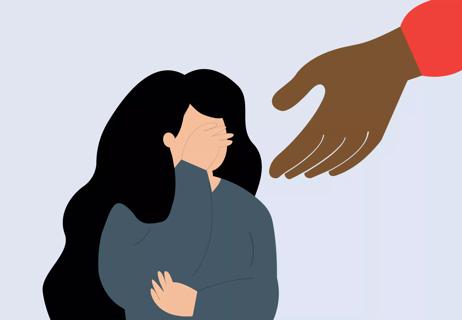Defend your own needs, but also practice empathy

Have you ever felt taken advantage of, or dismissed, by a partner, family member, teacher or boss? That’s resentment rearing its ugly head.
Cleveland Clinic is a non-profit academic medical center. Advertising on our site helps support our mission. We do not endorse non-Cleveland Clinic products or services. Policy
“At first, you feel angry that you’re not being treated fairly or that your needs are being ignored,” says psychologist Susan Albers, PsyD. “Over time, this snowballs into disappointment, bitterness and hard feelings.”
Adds psychologist Scott Bea, PsyD, “I once thought of resentment as a failure in problem-solving — but now I think it’s a battle for empathy.
“It’s hard to address misunderstandings when you don’t think the other person understands or appreciates you. You get into a tug of war about who’s right and who’s wrong, and egos get in the way.”
When everyone’s in battle mode, it’s hard to acknowledge each other’s humanity.
Here are six common problems that spark the fires of resentment.
When someone insists that they’re right all the time, it comes across as arrogant.
“If you want me to empty the dishwasher, fold the laundry or manage the toothpaste in a certain way, you’re imposing your views of the world onto me,” says Dr. Bea. “There are many paths up the mountain.”
Defend your right to do things your own way. “Speak up quickly; don’t let the feelings fester,” says Dr. Albers. “The longer you wait, the more resentment is likely to build and explode in an argument over something insignificant.”
If you think someone is being selfish, first try stepping into their shoes. “Ask yourself why they are so intent on getting their own needs met,” suggests Dr. Albers.
Some people weren’t taught etiquette as kids, notes Dr. Bea. Others endured childhood trauma that made them focus on survival, and their own needs, first.
Gently tell the person how their behavior makes you feel, suggests Dr. Albers, using “I” statements.
If that doesn’t work, learn to tell the person “no” confidently and with conviction, she says.
Thoughtless remarks and taunts rankle. “Know your trigger buttons,” says Dr. Albers. “Some people trigger our anger without even knowing it.”
Considering the person’s intent can head off resentment before it takes root.
But if other person knows your triggers and intentionally hits them, your resentment may be a message.
“Don’t ignore the messenger,” she says. “If you feel repeatedly discounted by a friend, this may be a sign that they are not a good person to have in your life.”
Considering other people’s nature and habits with clear eyes can spare you emotional turmoil.
“Let’s say you expect your significant other to buy you a romantic gift, and they don’t,” says Dr. Albers. “If it’s not in their personality to do something like that, you’ve set yourself up for feeling resentful.”
Try adjusting your expectations instead. Your partner may be showing appreciation in a different way.
Does your significant other seem miles away when you’re chatting in the morning? “Don’t take it so personally,” says Dr. Albers. “Listening is incredibly difficult. Expect that you’ll have to repeat your message.”
Send a voice mail or text message later, and recap what you wanted to say.
You may feel that because someone is never on time, they don’t care about you.
“It’s tempting to show up late for them, but that only adds fuel to the fire,” says Dr. Albers. “Gently point out how their lateness makes you feel, and what you need.”
Then set firm limits. Tell the other person how long you’ll wait, and have a backup plan in place in case they’re late.
A change in thinking can also help. “Try to view the other person’s lateness as a reflection on them, and not you,” suggests Dr. Bea. “Being late may have less to do with respecting your time and more to do with their own habits or anxiety.”
Always running into the house “for one more thing,” or getting distracted by inconsequential things just before you have to leave may be an attempt to ease anxiety.
“You can decide not to be emotionally injured or roughed up by any of that,” says Dr. Bea.
What should you do when resentment sours a relationship?
There’s no question that you should sever ties if you’re being abused, says Dr. Bea.
But the lines are less clear when resentment has been building for lesser concerns.
“For example, if you put a high priority on family, or if work pays your bills, then you may have to learn to tolerate others’ displays of humanness,” says Dr. Bea.
Practicing empathy can help. “Acceptance and forgiveness reduce resentment,” he notes.
It’s possible to learn to be a more empathetic partner and to let go of problem behaviors. But you have to be willing to change.
“A good therapist can show you how to accept the discomfort associated with change — and offer you options you may not have considered and a perspective you may not have seen,” says Dr. Bea.
It needn’t be long-term. “Most people go to therapy for a little while, then practice like crazy afterward,” he notes. “And it’s in the practicing like crazy that people grow.”
You can become skilled at quickly getting to the root of a relationship problem — before anger, misery or bitterness creep in, says Dr. Albers.
“Then, once you address an issue, don’t rehash it,” she advises. “Consider it a learning moment to use in the future. “Don’t look backward. You aren’t going that way anymore.”
Learn more about our editorial process.

It’s not about embracing your dark side — it’s about showing up for yourself

Narcissistic personality disorder is a mental health condition, not an insult

Whether this behavior is abusive depends on the person doing it and their motivation

This type of bruise might benefit from warm compresses, but time is really the healing key

Being intentional has far-reaching benefits

Being ‘hooked’ on love can cause unhealthy relationship patterns and obsessive thoughts

This manipulative tactic sucks people back into destructive relationships

This toxic approach to conflict is unintentional or intentional and verbal or nonverbal

Your metabolism may torch 1,300 to 2,000 calories daily with no activity

A gentle touch in all the right places may help drain your sinuses